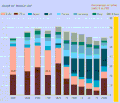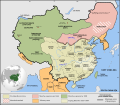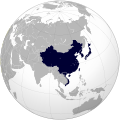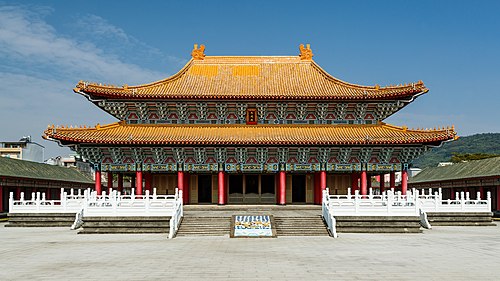Portal:Asia

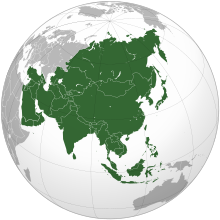 Asia (/ˈeɪʒə/ ⓘ AY-zhə, UK also /ˈeɪʃə/ AY-shə) is the largest continent in the world by both land area and population. It covers an area of more than 44 million square kilometers, about 30% of Earth's total land area and 8% of Earth's total surface area. The continent, which has long been home to the majority of the human population, was the site of many of the first civilizations. Its 4.7 billion people constitute roughly 60% of the world's population. Asia shares the landmass of Eurasia with Europe, and of Afro-Eurasia with both Europe and Africa. In general terms, it is bounded on the east by the Pacific Ocean, on the south by the Indian Ocean, and on the north by the Arctic Ocean. The border of Asia with Europe is a historical and cultural construct, as there is no clear physical and geographical separation between them. It is somewhat arbitrary and has moved since its first conception in classical antiquity. The division of Eurasia into two continents reflects East–West cultural, linguistic, and ethnic differences, some of which vary on a spectrum rather than with a sharp dividing line. A commonly accepted division places Asia to the east of the Suez Canal separating it from Africa; and to the east of the Turkish Straits, the Ural Mountains and Ural River, and to the south of the Caucasus Mountains and the Caspian and Black seas, separating it from Europe. China and India traded places as the largest economies in the world from 1 to 1800 CE. China was a major economic power for much of recorded history, with the highest GDP per capita until 1500. The Silk Road became the main east–west trading route in the Asian hinterlands while the Straits of Malacca stood as a major sea route. Asia has exhibited economic dynamism as well as robust population growth during the 20th century, but overall population growth has since fallen. Asia was the birthplace of most of the world's mainstream religions including Hinduism, Zoroastrianism, Judaism, Jainism, Buddhism, Confucianism, Taoism, Christianity, Islam, Sikhism, as well as many other religions. (Full article...) Featured article
Palmyra (/pælˈmaɪrə/ pal-MY-rə; Palmyrene: 𐡶𐡣𐡬𐡥𐡴 (), romanized: Tadmor; Arabic: تَدْمُر, romanized: Tadmur) is an ancient city in the eastern part of the Levant, now in the center of modern Syria. Archaeological finds date back to the Neolithic period, and documents first mention the city in the early second millennium BC. Palmyra changed hands on a number of occasions between different empires before becoming a subject of the Roman Empire in the first century AD. (Full article...)
Selected Country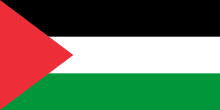 Palestine (Arabic: فلسطين, romanized: Filasṭīn), officially the State of Palestine (دولة فلسطين, Dawlat Filasṭīn), is a country in the southern Levant region of West Asia. It encompasses two disconnected territories — the West Bank and the Gaza Strip, collectively known as the Palestinian territories — within the larger region of Palestine. The country shares its borders with Israel to north, west and south, Jordan to the east and Egypt to the southwest. It has a combined land area of 6,020 square kilometres (2,320 sq mi) while its population exceeds five million people. Its proclaimed capital is Jerusalem while Ramallah serves as its administrative center and Rafah is currently its largest city. Arabic is the official language. The majority of Palestinians practice Islam while Christianity also has a significant presence. The region of Palestine has played an important part in world history. The Canaanites, Israelites, Assyrians, Babylonians, Persians, Greeks, Romans and Byzantines all left their mark on the land. In addition to its historical significance, Palestine holds profound religious importance for Judaism, Christianity and Islam. Throughout history the region has experienced periods of coexistence and conflict between different religious and ethnic groups. Notably, during the Middle Ages, when Jewish communities faced persecution, they found refuge and protection under Muslim rule and the wider Islamic world. The Ottoman Empire, which controlled Palestine from the 16th century until its collapse at the end of World War I, provided a sanctuary for Jews fleeing persecution in Europe. The end of the Ottoman rule marked a new chapter in Palestine's history. Following World War I, the British Empire assumed control of the region under the League of Nations mandate. The British Mandate for Palestine, established in 1920, brought significant changes to the political and social landscape of the area, setting the stage for the conflicts and struggles that would follow. (Full article...)Featured biographyShah Rukh Khan (pronounced [ˈʃɑːɦɾʊx xɑːn] ⓘ; born 2 November 1965), also known by the initialism SRK, is an Indian actor and film producer who works in Hindi films. Referred to in the media as the "Baadshah of Bollywood" and "King Khan", he has appeared in more than 100 films, and earned numerous accolades, including 14 Filmfare Awards. He has been awarded the Padma Shri by the Government of India, as well as the Ordre des Arts et des Lettres and Legion of Honour by the Government of France. Khan has a significant following in Asia and the Indian diaspora worldwide. In terms of audience size and income, several media outlets have described him as one of the most successful film stars in the world. Many of his films thematise Indian national identity and connections with diaspora communities, or gender, racial, social and religious differences and grievances. Khan began his career with appearances in several television series in the late 1980s and made his Bollywood debut in 1992 with the musical romance Deewana. He was initially recognised for playing villainous roles in the films Baazigar (1993) and Darr (1993). Khan established himself by starring in a series of top-grossing romantic films, including Dilwale Dulhania Le Jayenge (1995), Dil To Pagal Hai (1997), Kuch Kuch Hota Hai (1998), Mohabbatein (2000), Kabhi Khushi Kabhie Gham... (2001), Kal Ho Naa Ho (2003), Veer-Zaara (2004) and Kabhi Alvida Naa Kehna (2006). He earned critical acclaim for his portrayal of an alcoholic in the period romantic drama Devdas (2002), a NASA scientist in the social drama Swades (2004), a hockey coach in the sports drama Chak De! India (2007), and a man with Asperger syndrome in the drama My Name Is Khan (2010). Further commercial successes came with the romances Om Shanti Om (2007) and Rab Ne Bana Di Jodi (2008), and with his expansion to comedies in Chennai Express (2013) and Happy New Year (2014). Following a brief setback and hiatus, Khan made a career comeback with the 2023 action thrillers Pathaan and Jawan, both of which rank among the highest-grossing Indian films. (Full article...)General imagesThe following are images from various Asia-related articles on Wikipedia. Featured pictureThe Kaohsiung Confucius Temple is a temple dedicated to the memory of Confucius near Lotus Pond, Kaohsiung, Taiwan. The temple was originally constructed in 1684, and renovated during the Qing dynasty. However, during the Japanese colonial period, the temple fell into disuse and disrepair. A new temple was constructed in 1976, now on the northwest corner of Lotus Pond.
Did you know...
Updated: 6:33, 14 February 2024 In the news
Related portalsMajor Religions in Asia Middle East Central Asia and Surroundings Indian Subcontinent Southeast Asia East Asia Selected panorama
A panoramic view of the Hiroshima Peace Memorial, the site of the first atomic bomb to be used in warfare on August 6, 1945, during the final stages of World War II. Over 70,000 people were killed immediately, and another 70,000 suffered fatal injuries from the radiation, after the U.S. Army Air Force bomber Enola Gay dropped the bomb, codenamed "Little Boy". The Genbaku ("A-bomb") Dome (center) was directly beneath the blast, but managed to survive mostly intact. TopicsCategoriesAssociated WikimediaThe following Wikimedia Foundation sister projects provide more on this subject:
More portalsShortcuts to this page: Asia portal • P:ASIA Purge server cache |

















